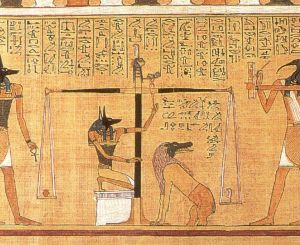By Jin-yeong Yi

“That society who has not the ability, or who is not willing to procure man any one benefit, loses all its rights over him; Nature, when it has rendered his existence completely miserable, has in fact, ordered him to quit it: in dying he does no more than fulfil one of her decrees, as he did when he first drew his breath. To him who is fearless of death, there is no evil without a remedy; for him who refuses to die, there yet exists benefits which attach him to the world; in this case let him rally his powers—let him oppose courage to a destiny that oppresses him—let him call forth those resources with which Nature yet furnishes him; she cannot have totally abandoned him, while she yet leaves him the sensation of pleasure; the hopes of seeing a period to his pains.”
—Paul-Henri Thiry, Baron d’Holbach, The System of Nature
It seems obvious that the debate on assisted suicide ultimately comes down to the question of whether suicide itself is right or wrong. Many of the arguments against suicide, it seems to me, are predicated on religion. In terms of rhetoric, one probably need not look further than G. K. Chesterton:
“Under the lengthening shadow of Ibsen, an argument arose whether it was not a very nice thing to murder one’s self. Grave moderns told us that we must not even say “poor fellow,” of a man who had blown his brains out, since he was an enviable person, and had only blown them out because of their exceptional excellence. Mr. William Archer even suggested that in the golden age there would be penny-in-the-slot machines, by which a man could kill himself for a penny. In all this I found myself utterly hostile to many who called themselves liberal and humane. Not only is suicide a sin, it is the sin. It is the ultimate and absolute evil, the refusal to take an interest in existence; the refusal to take the oath of loyalty to life. The man who kills a man, kills a man. The man who kills himself, kills all men; as far as he is concerned he wipes out the world. His act is worse (symbolically considered) than any rape or dynamite outrage. For it destroys all buildings: it insults all women. The thief is satisfied with diamonds; but the suicide is not: that is his crime. He cannot be bribed, even by the blazing stones of the Celestial City. The thief compliments the things he steals, if not the owner of them. But the suicide insults everything on earth by not stealing it. He defiles every flower by refusing to live for its sake. There is not a tiny creature in the cosmos at whom his death is not a sneer. When a man hangs himself on a tree, the leaves might fall off in anger and the birds fly away in fury: for each has received a personal affront. Of course there may be pathetic emotional excuses for the act. There often are for rape, and there almost always are for dynamite. But if it comes to clear ideas and the intelligent meaning of things, then there is much more rational and philosophic truth in the burial at the cross-roads and the stake driven through the body, than in Mr. Archer’s suicidal automatic machines. There is a meaning in burying the suicide apart. The man’s crime is different from other crimes—for it makes even crimes impossible.
“About the same time I read a solemn flippancy by some free thinker: he said that a suicide was only the same as a martyr. The open fallacy of this helped to clear the question. Obviously a suicide is the opposite of a martyr. A martyr is a man who cares so much for something outside him, that he forgets his own personal life. A suicide is a man who cares so little for anything outside him, that he wants to see the last of everything. One wants something to begin: the other wants everything to end. In other words, the martyr is noble, exactly because (however he renounces the world or execrates all humanity) he confesses this ultimate link with life; he sets his heart outside himself: he dies that something may live. The suicide is ignoble because he has not this link with being: he is a mere destroyer; spiritually, he destroys the universe. And then I remembered the stake and the cross-roads, and the queer fact that Christianity had shown this weird harshness to the suicide. For Christianity had shown a wild encouragement of the martyr. Historic Christianity was accused, not entirely without reason, of carrying martyrdom and asceticism to a point, desolate and pessimistic. The early Christian martyrs talked of death with a horrible happiness. They blasphemed the beautiful duties of the body: they smelt the grave afar off like a field of flowers. All this has seemed to many the very poetry of pessimism. Yet there is the stake at the crossroads to show what Christianity thought of the pessimist.”[1]
While I agree that Archer’s view is dubious (the last time I checked, a “golden age” consisted of mass flourishing, not mass extinction), I also find myself in vehement disagreement with Chesterton’s condemnation.
True, Chesterton himself did contemplate suicide in his adolescence, but in the above passage he speaks as someone who is rationalizing his religious beliefs, not someone who has truly known the power of the desire to die. According to his logic, exterminating 7 billion people pales in comparison, both literally and figuratively, to taking one’s own life without injuring anyone else. It follows that a Vincent van Gogh, say, or a Dimitris Christoulas,[2] commits a far graver crime than a Genghis Khan or a Joseph Stalin. As long as the murderer asks God for forgiveness, he will be given a far more lenient sentence than the suicide, and he will, unlike the suicide, be given a proper burial. Personally, I think that such a notion is breathtakingly ludicrous and silly, and hardly deserves a reply. I must say of Chesterton what Eugene Rose (Father Seraphim) once said of Arthur Schopenhauer: “[He] does not speak to us as one who knows, as one who has truly had a vision of the nature of things.”[3]
I tend to see myself as avoiding both extremes of opinion, the one represented by Chesterton and the other represented by Archer. In other words, I see suicide as being neither an absolute “good” nor an absolute “evil.” In my view, the decision to stay and the decision to leave are more or less equally valid. Let those who wish to live continue their struggle in this world of suffering, and let those who wish to die embark on, ahead of schedule, that great voyage that awaits each and every one of us. I can praise the former for their courage to cling onto life, and the latter for their courage to embrace death.
In an interview, Ludwig Minelli, founder and director Swiss assisted dying organization Dignitas, notes a peculiar pattern he has observed among potential suicides throughout the years:
“Seventy percent of our members which have got provisional green light [for assisted suicide] do never call again. It’s very interesting.
“They are just looking in order to have a choice, to make a choice, because normally they are in a terrible dilemma. … Would I have to go through the whole illness until the so-called natural death, with all the pains, with all the difficulties, or must I make a very risky suicide attempt? When we are getting the provisional green light, this is a sort of opening an emergency exit. So they know, ‘I could go through this emergency exit if really I am in difficulties,’ and this is calming them. …”[4][5]
When I say that suicide saves, I am not being flippant. Of course, the act of suicide destroys, but the possibility of suicide is, as it turns out, a double-edged sword. With it comes the realization that the world has only so much power over you, and that it can rule you only for as long as you allow it to. Those who are truly prepared to die have little left to be afraid of. As strange as it might sound to some, the clear knowledge that one can liberate oneself from an unbearable existence at any moment one chooses can give one not only strength but also a sense of near-invincibility, which can give rise to the will to “oppose courage to a destiny that oppresses”–if only for another day.
Notes
[1] Orthodoxy, Chapter V: The Flag of the World
[2] http://www.guardian.co.uk/world/2012/apr/05/greece-suicide-tributes-retired-pharmacist
[3] “Schopenhauer: System; Comment,” quoted from Father Seraphim Rose: His Life and Works by Hieromonk Damascene
[4] http://www.pbs.org/wgbh/pages/frontline/suicidetourist/etc/minelli.html
[5] Mr. Minelli goes on to note: “Not only never come to Zurich, never call again. We never hear from them. Then we get the invoice for the membership fee for the next year, and then they will pay the membership fee, but they will never call again. It’s very, very interesting.”





